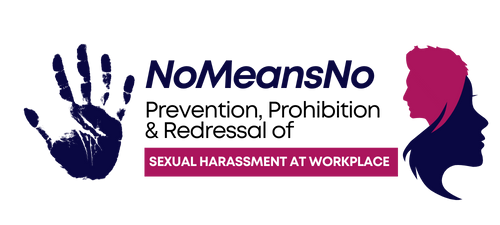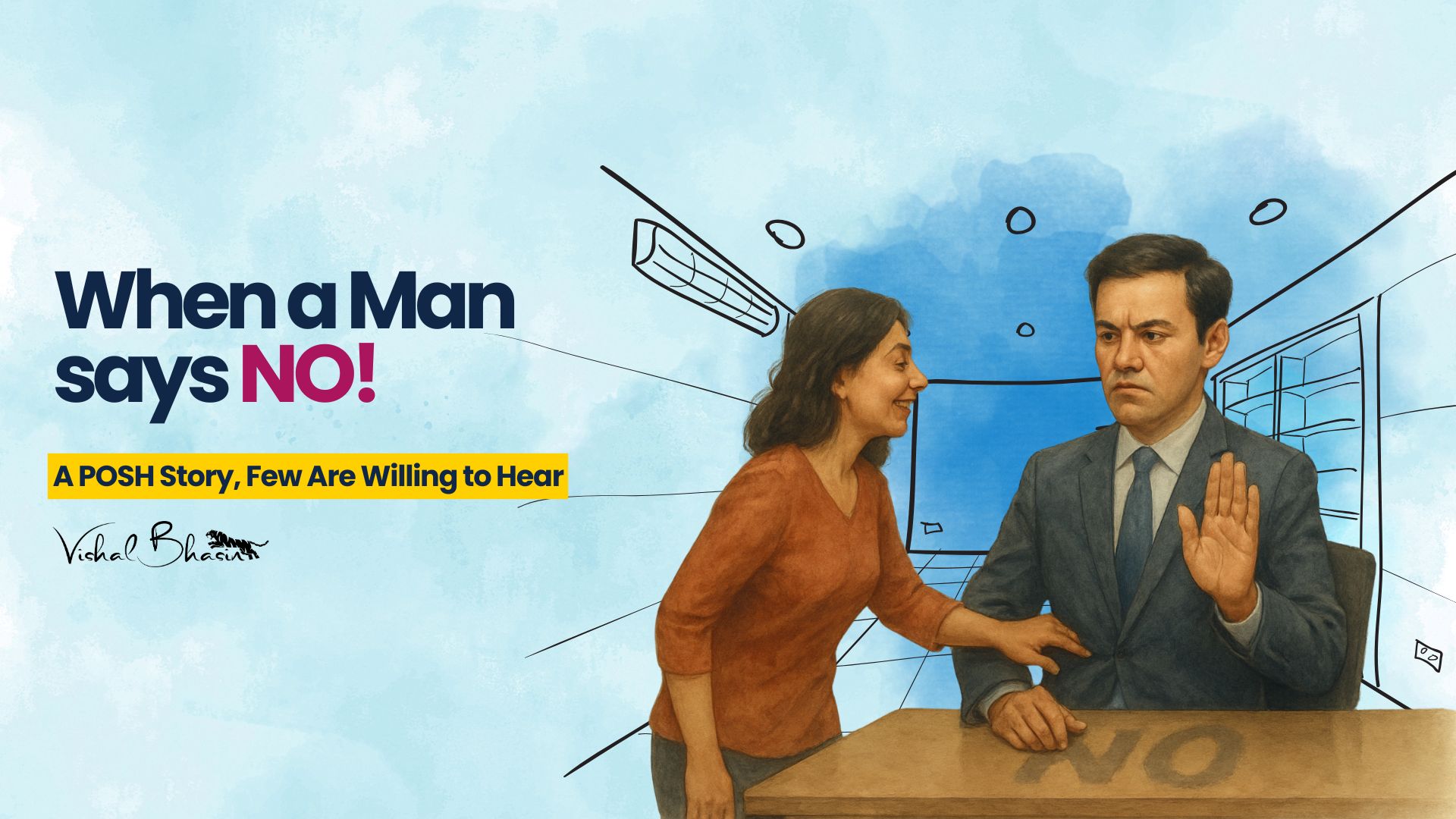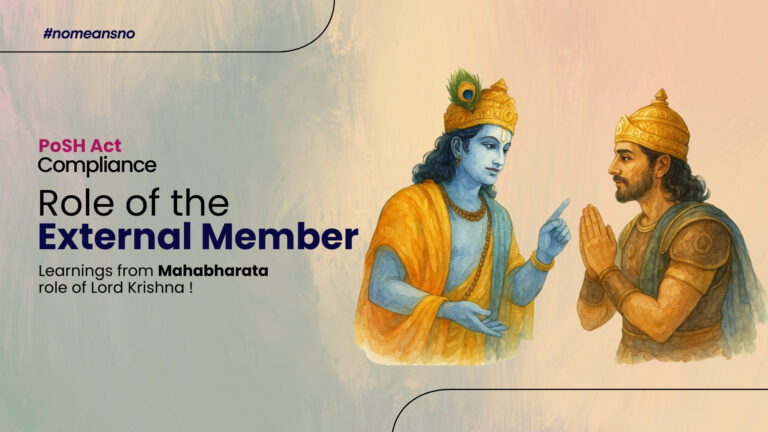When a Man Says No: A POSH Story Few Are Willing to Hear
Let me take you back to a moment that made me pause and reflect in the middle of a focused group POSH training session—something I’ve done hundreds of times across India.
I was facilitating a PoSH awareness workshop for a large corporate, addressing a mixed group of employees from different verticals. The conversation had warmed up. People were participating. There was laughter, some discomfort—as always happens when you start peeling back layers around gender and power.
Then, a young man—let’s call him R—raised his hand. He looked calm, but you could tell he was choosing his words carefully.
He said,
“This might sound silly to some, but it’s been playing on my mind. I don’t know if I was harassed. Or whether I should have enjoyed it.”
The room quieted down.
He shared that a female colleague had become a regular companion during smoke breaks. He never minded. In fact, he liked her company. She’d often ask for a cigarette, and he would oblige. It became a sort of habit. Until one day, he overheard her joking with others about how easily he gave in—how he was like a ‘lost puppy’ she could manipulate for a cigarette.
That stung.
The next day, when she came to his desk and casually asked for a smoke, he said he didn’t have any. That should have been the end of it. But she laughed and insisted he was lying. Then—half-jokingly—she began patting down his pockets.
Yes, physically.
She searched him like a bouncer at a nightclub, tickling him on his ribs, shoulders, and neck. He froze. Not knowing what to do, he quickly pulled the cigarette pack out of his drawer and gave it to her—just to make it stop.
He said he felt uncomfortable, embarrassed, awkward… and deeply unsure of whether what just happened was normal or not.
Still confused, he approached his HRBP and explained everything. And what he was told shocked me more than I’d like to admit.
“Dude, you should be lucky. A girl is touching you and asking you for smokes. What’s the problem? Enjoy it. And anyway, POSH is only for women, not men.”
The room I was in that day sat in stunned silence.
And this young man—still calm, but with obvious frustration—looked directly at me and asked, “Am I really supposed to enjoy this? Just because I’m a man? What if I had done the same to her—would HR ask her to enjoy it too?”
That question sat heavy on my chest. Not because it was unfamiliar—but because it was uncomfortably familiar.
In the many years I’ve worked as an External Member for Internal Committees (IC) across organizations, I’ve heard many such stories. They rarely get reported. They are rarely validated. And they are almost never addressed.
The POSH Act, 2013, as we know, is designed to protect women. And rightly so—given the historical and social backdrop of sexual harassment in India. But what’s often overlooked is that harassment itself is not gender-exclusive. Sexual harassment can happen to anyone—regardless of gender, age, seniority, or role.
Yet we continue to respond with laughter, disbelief, or worse—dismissal—when a man tries to share discomfort.
In R’s case, many argued later that he “didn’t seem uncomfortable before” and “was okay with giving her cigarettes until he got offended.” But here’s the thing—he was well within his rights to stop giving them, for any reason. Maybe he didn’t like the ridicule. Maybe he was simply done. That’s autonomy. The moment someone overrides that boundary—especially with unwanted touch—it crosses the line into something else.
Now reverse the situation. Imagine a man patting down a woman at her desk because she refused something he was used to getting from her. Would we hesitate to call that sexual harassment? Would we say, “Relax, he was just being playful”?
Of course not. We’d activate the POSH compliance mechanism, alert the Internal Committee, and trigger a formal inquiry. As we should.
But when the roles flip, the response becomes: “Come on, you’re a guy. Enjoy it.”
This is exactly why I believe organizations must take a bolder step. The POSH Act may be for women, but your internal code of conduct can and should be gender-neutral. It allows you to create a space where men, third-gender individuals, and same-sex interactions are also held accountable to the same standards of respect and safety.
Implementing a gender-neutral POSH policy doesn’t dilute the spirit of the Act—it complements it. In fact, it strengthens your workplace culture. It allows you to respond to any act of discomfort, regardless of whether it fits neatly into the Act’s legal scope. It lets your employees know that dignity is not conditional on gender.
As trainers and facilitators of POSH training programs, we always talk about consent, boundaries, perception vs. intent. But we must also talk about the biases we carry in those perceptions. We must question our tendency to minimize discomfort based on who’s on the receiving end.
This isn’t just about law. It’s about leadership.
If you’re a manager, IC member, or HR leader, it’s time to reflect:
- Are we really listening when men report discomfort?
- Are we consistent in how we apply dignity and respect?
- Are we training our ICCs and leadership on biases within investigation processes?
This is why at No Means No, we continue to push for more inclusive POSH training, gender sensitisation, and the strengthening of Internal Committees through real-world cases like this. Because no policy matters until it’s lived.
Sexual harassment is not always loud. Sometimes, it hides behind laughter.
Sometimes, it hides behind a joke.
And often, it hides behind “Relax, you’re a man.”
Let’s stop hiding. Let’s start listening better. Because if someone says No—it should mean no. For everyone.
#NoMeansNo






One Comment
Very happy that u are sharing this as it become more clear every time we read such things from an expert how and why we should handle it as an HR or POSH member.